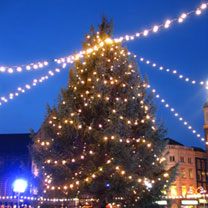about Christmas trees …
28-11-2011 - Posted by Andre Piet
You probably know that Jesus was not born in the “middle of a winter night”. Maybe you also know that almost every known Christmas attribute has not come to us from Scripture, but are man-invented details, whether that pertains to the stall and the straw or to the ox and the donkey or to the three kings, etc. – in the Bible will you look in vain for all these particulars in connection with the birth of Jesus. Our Christmas celebration is a christianized version of the older, Germanic Midwinter-Festival, which celebrated the winter solstice. It will surprise many, but on closer examination, this much older festival, has better ‘papers’ (read: biblical legitimacy) than our sweet and melodious Christmas story. Consider the Christmas tree. This tree is an emblem of light and life. Think about it. While in nature, death rules and all the trees have dropped their leaves, there is one type of tree that remains green: the evergreen tree. This tree represents life that is stronger than death; precisely in the darkest days of the year, when the light is to begin gaining ground and the days (slowly but surely,) are to grow longer! Add these two concepts of light and life together, and behold: an evergreen tree, bathed in light; rich with fruits (symbolized by decorative balls) and the top crowned with a glorious peak… ! Can you not imagine that for the ancient Germans, the feast of the winter solstice was no less than a powerful sign of hope? It was the hope of the victory of Light and Life! Since the days of Adam, man retains the memory of the promise of God, namely, that someday “the seed of woman” (do not forget the sign of ’the Virgin’ in the sky!) will achieve the great victory. And no matter how this global memory, over thousands of years, may have become blurred, it has never disappeared, altogether. The tree, which around this time of the year is found in most homes, speaks of that memory. The only difference, it seems, is that the Germans of that time were better informed than their present-day, christianized descendants… ——————————— translation: Peter Feddema ![]()

 English Blog
English Blog